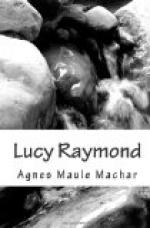At last, tired with her wanderings, and with hands full of her treasures, she threw herself down on a bed of dry moss that carpeted the top of a high bank of rock which overlooked the river winding away beneath, while overhead, through the feathery sprays of the long, straggling pine boughs, the slanting sunbeams flickered on the turf below.
There, in that solitary stillness—all the stiller for the confused murmur of soft sounds, and the fresh, sweet breath of the woods perfuming the air—unaccustomed thoughts came into the little girl’s mind,—thoughts which, in the din and bustle of the city, where the tide of human interests sufficed to fill up her undeveloped mind, had scarcely ever entered it. But here, where the direct works of God alone were around her, her mind was irresistibly drawn towards Him of whom Miss Preston had told her, that He had made her and all she saw around her, and who lived, she supposed, somewhere beyond that blue sky. With so many pleasant things around her, the thought of their Maker was pleasant too. But then Miss Preston had told her that God loved what was good, but hated what was bad; and did not her new mother constantly tell her she was a “bad child?”—an accusation in which her conscience told her there was much truth. So God could not love her, she thought.
But Miss Preston had said that God did love her—that He cared for her continually, and wished to make her good and happy—that He had even, in some strange way which she could not understand, sent His Son to die for her, that she might be made good. It was all new and strange, but she had faith in Miss Preston; and because she had told her, she believed it must be true, that she, who had come to think herself—poor child—too bad for any one to care for, had really a great, kind Friend near her, though she could not see Him, and loving her more than the mother whose warm caress she could still remember. It was an idea that might seem beyond the grasp of a poor untaught child, were it not that He who reveals Himself to babes and sucklings can speak to the heart He has made in ways beyond our power to trace. The idea in Nelly’s mind of that wonderful love which she so sorely needed, was more enlightened than many a philosopher’s conception of divinity, and the dark eyes filled with tears as a half-formed prayer awoke from her heart to the loving Jesus, who, Miss Preston had told her, would hear and answer her.
And who could doubt that He did hear and answer the desolate, uncared-for child, scarcely knowing as yet what “good” meant, since her knowledge had been only of evil! Her conscience, however, was not dead, though neglected; she knew at least what “wrong” was, and felt she must leave off doing it if the Saviour was to be her friend. But how should she be able to leave off her bad, idle ways, and become a good, industrious girl, such as her new mother said most of the little girls in Ashleigh were? Then she remembered the words which Miss




